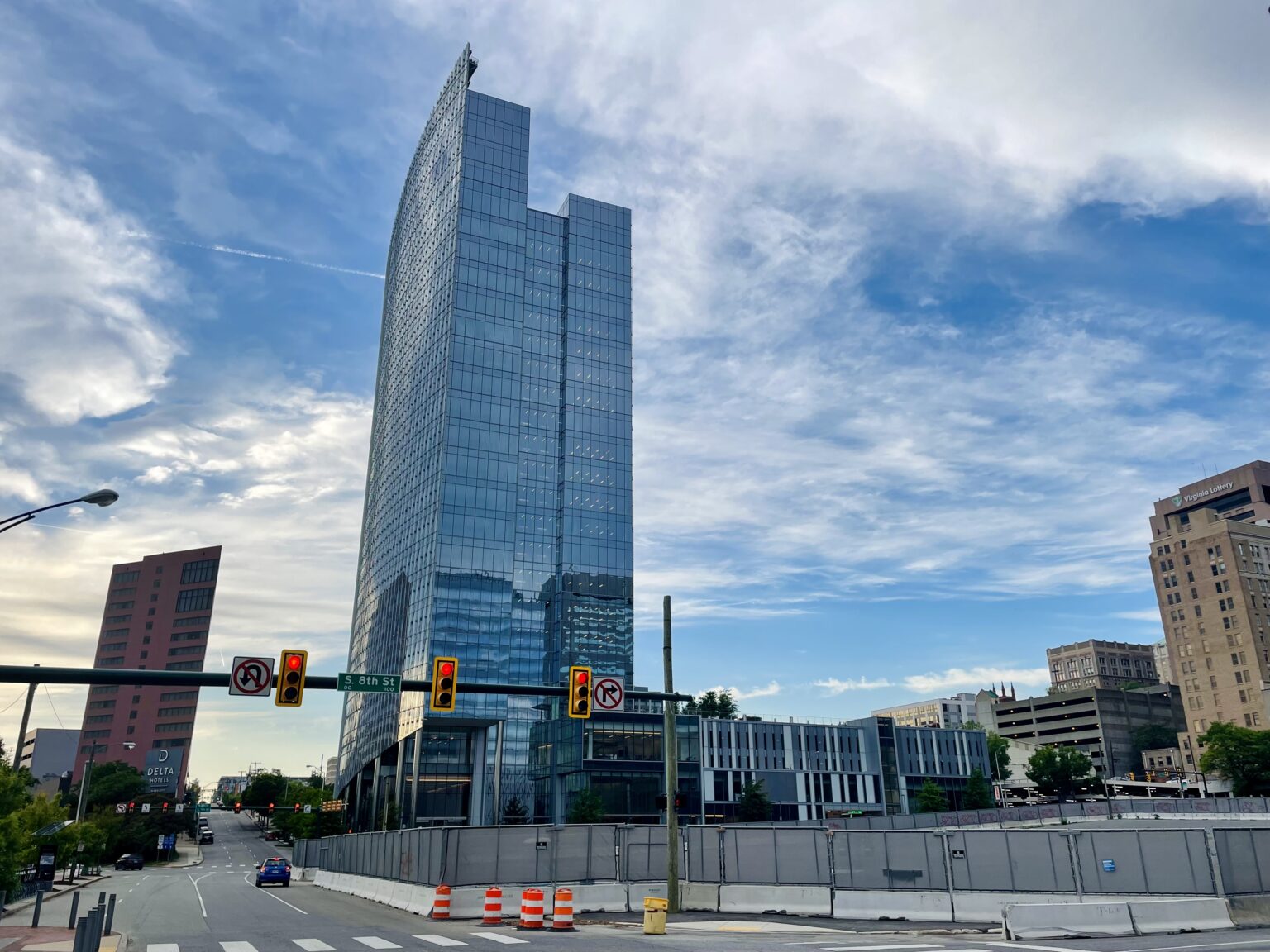WYATT GORDON
MAY 3, 2023
Excerpt

Dominion Energy’s headquarters behind their proposed parking lot. (Wyatt Gordon)
Republicans rarely encounter a tax cut they don’t like. But this year, a bill which could have lowered homeowners’ property taxes in one locality was killed on a party-line vote. HB 2112 from Del. Sally Hudson, D-Charlottesville would have enabled the city to become only the fifth locality in Virginia to progress from a reliance on property taxes towards a land value tax.
Beloved by economists and Georgists, land value taxes in their purest form assess how much property owners pay based on the “unimproved” value of their land rather than the value of what, if anything, is built upon it. While our current tax system punishes property owners for putting their parcels to higher use and disincentivizes development, a land value tax is designed to encourage growth in city centers while lowering the tax burden on the average homeowner.
If land value taxes are a practical, pro-growth policy, then why hasn’t a single Virginia locality made the switch?
Under Virginia’s current code, only the Cities of Fairfax, Poquoson, Richmond and Roanoke are allowed to enact a land value tax. Although none of the four has even come close to passing the required local ordinance to make it the law of the land, Richmond is the most recent jurisdiction to ask for the authority.
In 2020, then-Sen. Jennifer McClellan, D-Richmond, shepherded SB 725 through the General Assembly at the behest of the City Council she represented, in order to authorize the city to “impose a tax rate on improvements to real property that is different than the City’s tax rate on the land upon which the improvements are located.” First District representative Andreas Addison requested McClellan carry the bill.
“Since we are a landlocked city, we have to be smart about how we use our land,” Addison said on a recent call. “We’ve been leaning on market demand for home values to get more revenue, but a land value tax would put the focus on new development and growth and not on the backs of our current residents. We can’t just zone for the growth we want, we need to tax for it.”
To Addison, Dominion Energy’s recently announced electric vehicle parking lot is a perfect example of why Virginia’s capital needs a land value tax. The corporation’s initial redevelopment plans for the parcel envisioned a second tower identical to the freshly finished skyscraper the City of Richmond assesses at a value of more than $307 million. The planned parking lot with EV chargers won’t be worth much more than the $10 million value of the land and will net the city just a fraction of the tax revenue.
“It’s zoned for a use that is worth a lot more than parking EVs,” Addison said. “That land is a waste of an opportunity that should have been more hotels or housing. A land value tax could put some pressure on people sitting on valuable downtown land to finally develop it.”
Currently, the city taxes the combined value of the land and any built structures at $1.20 on every $100 of value. Addison said that a preliminary analysis by the Center for Property Tax Reform, however, found that taxing the land at two dollars and the built structures at just two cents would minimally lower taxes on homeowners and quadruple the cost of sitting on vacant land and asphalt parking lots in the city.
Pennsylvania allows land value taxes statewide, and an experiment with the policy in Allentown saw 90% of homes’ tax liability lessened. California just started studying the proposal. Detroit could have a land value tax by the end of the year. Minnesota may set one up in specific districts. Even the country of Denmark relies upon land value taxes. Capturing the land value around stations is how Japan finances its extensive train and public transit systems.
“America’s total land value lies between 2.2 and 3.5 trillion dollars,” said Lars Doucet, author of “Land is a Big Deal.” “70% of that value derives from the United States’ urban areas, but we are kind of squandering it. Undervalued millions of dollars of property are stuck as parking lots in the center of our cities where there could be thousands of residents and businesses.”
After the pandemic sent home prices soaring without homeowners having to make any improvements to their property, land values have become an increasingly costly part of any home’s valuation. A land value tax could ironically reverse that trend by pushing the demand for development out of the suburbs and back toward city centers.
Comment:
“A land value tax could put some pressure on people sitting on valuable downtown land to finally develop it.”
Land speculators are sitting on valuable land everywhere, including Northwestern U.S. cities. A study of the effects of a land value tax in Salem, Oregon was conducted by officers of Common Ground OR/WA. As is typical, the highest value land is located within the Central Business District. The study looked at distortions in tax burden caused by the current equal rate property tax system with 3% annual assessment growth limits.
Within the Salem CBD, owners of developed parcels pay more taxes under the limited taxable assessment than they would under real market value (RMV), whereas undeveloped parcels including surface parking lots pay less. The effect of these perverted incentives produced by Oregon’s peculiar tax system is a financial reward for not developing downtown sites. The bonus to 335 undeveloped central sites is a 7.5 percent decrease in tax burden.
Reverting to RMVs and changing to a split-rate land value tax reverses the incentives. If 95% of the total tax rate were on land assessments, and 5% on improvements, the average tax shift on undeveloped downtown sites would amount to a 200 percent increase. If Salem were to adopt LVT the average tax levy would triple, putting pressure on those landholders to develop their land more intensively.
Tom Gihring, Research Director
Common Ground – OR/WA



